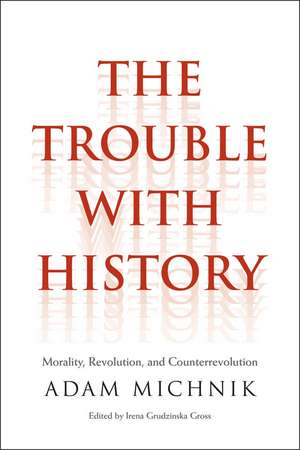The Trouble with History: Morality, Revolution, and Counterrevolution: Politics and Culture
Autor Adam Michnik Editat de Irena Grudzinska Gross Traducere de Elzbieta Matynia, Agnieszka Marczyk, Roman Czarny Cuvânt înainte de James Davison Hunteren Limba Engleză Hardback – 27 mai 2014
A brilliant meditation on politics, morality, and history from one of the most courageous and controversial authors of our age
Renowned Eastern European author Adam Michnik was jailed for more than six years by the communist regime in Poland for his dissident activities. He was an outspoken voice for democracy in the world divided by the Iron Curtain and has remained so to the present day. In this thoughtful and provocative work, the man the Financial Times named “one of the 20 most influential journalists in the world” strips fundamentalism of its religious component and examines it purely as a secular political phenomenon.
Comparing modern-day Poland with postrevolutionary France, Michnik offers a stinging critique of the ideological “virus of fundamentalism” often shared by emerging democracies: the belief that, by using techniques of intimidating public opinion, a state governed by “sinless individuals” armed with a doctrine of the only correct means of organizing human relations can build a world without sin. Michnik employs deep historical analysis and keen political observation in his insightful five-point philosophical meditation on morality in public life, ingeniously expounding on history, religion, moral thought, and the present political climate in his native country and throughout Europe.
Renowned Eastern European author Adam Michnik was jailed for more than six years by the communist regime in Poland for his dissident activities. He was an outspoken voice for democracy in the world divided by the Iron Curtain and has remained so to the present day. In this thoughtful and provocative work, the man the Financial Times named “one of the 20 most influential journalists in the world” strips fundamentalism of its religious component and examines it purely as a secular political phenomenon.
Comparing modern-day Poland with postrevolutionary France, Michnik offers a stinging critique of the ideological “virus of fundamentalism” often shared by emerging democracies: the belief that, by using techniques of intimidating public opinion, a state governed by “sinless individuals” armed with a doctrine of the only correct means of organizing human relations can build a world without sin. Michnik employs deep historical analysis and keen political observation in his insightful five-point philosophical meditation on morality in public life, ingeniously expounding on history, religion, moral thought, and the present political climate in his native country and throughout Europe.
Preț: 485.90 lei
Nou
Puncte Express: 729
Preț estimativ în valută:
92.98€ • 97.32$ • 77.39£
92.98€ • 97.32$ • 77.39£
Carte tipărită la comandă
Livrare economică 01-15 aprilie
Preluare comenzi: 021 569.72.76
Specificații
ISBN-13: 9780300185973
ISBN-10: 0300185979
Pagini: 208
Dimensiuni: 140 x 210 x 19 mm
Greutate: 0.37 kg
Editura: Yale University Press
Colecția Yale University Press
Seria Politics and Culture
ISBN-10: 0300185979
Pagini: 208
Dimensiuni: 140 x 210 x 19 mm
Greutate: 0.37 kg
Editura: Yale University Press
Colecția Yale University Press
Seria Politics and Culture
Recenzii
"An approach to the historical memory of political transitions that is at once inclusive and comprehensive"—Piotr H. Kosicki, The Nation
“Michnik reads history three-dimensionally, with one eye on the past and the other on the present. It’s a pleasure to watch him at work . . . . I see Michnik as an almost Miltonic figure, who understands that the greatness of a country . . . lies not in its military might, but in its capacity, even in a time of war and grave external threats, to engage in fearless, unfettered public debate about the great ideas of the day.”—Paul Wilson, The New York Review of Books
"[Michnik's] clear, unequivocal voice rings through, articulating vigorous humanist positions on contemporary politics. . . . As always, he is scintillating in his command of history."—Padraic Kenney, Slavic Review
“This is a thoughtful and thought-provoking essay on the borderlines of history, politics, and literature by one of East Europe’s most brilliant and respected public intellectuals. Written with clarity, erudition and political incisiveness, it provides an unusual perspective on a highly sensitive subject.”—Jacques Rupnik, Professor, Sciences-Po, Paris
“Michnik reads history three-dimensionally, with one eye on the past and the other on the present. It’s a pleasure to watch him at work . . . . I see Michnik as an almost Miltonic figure, who understands that the greatness of a country . . . lies not in its military might, but in its capacity, even in a time of war and grave external threats, to engage in fearless, unfettered public debate about the great ideas of the day.”—Paul Wilson, The New York Review of Books
"[Michnik's] clear, unequivocal voice rings through, articulating vigorous humanist positions on contemporary politics. . . . As always, he is scintillating in his command of history."—Padraic Kenney, Slavic Review
“This is a thoughtful and thought-provoking essay on the borderlines of history, politics, and literature by one of East Europe’s most brilliant and respected public intellectuals. Written with clarity, erudition and political incisiveness, it provides an unusual perspective on a highly sensitive subject.”—Jacques Rupnik, Professor, Sciences-Po, Paris
Notă biografică
Adam Michnik is editor-in-chief of the Warsaw daily newspaper Gazeta Wyborcza. He is a recipient of the Robert F. Kennedy Human Rights Award, the Imre Nagy Award, and the Goethe Prize, among many other honors. Irena Grudzinska Gross teaches East European literature at Princeton University.





